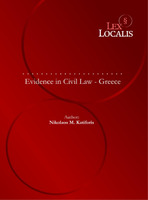Evidence in Civil Law - Greece
Abstract
The dominant position of the parties with regard to a civil litigation constitutes a major principle of the Greek Code of Civil Procedure (principle of free disposition). Furthermore, The orientation of the Greek Code of Civil Procedure towards the contemporary model of a more active judge, apart from the more or less passive role of the latter, mainly to examine lack of the procedural prerequisites (Art. 73 CCP) and the legal foundation of the action on his own motion, is only sporadically provided for in certain regulations. The right of defence before the courts is explicitly guaranteed by Art. 20 I b of the Greek Constitution explicitly guarantees: “Every person … may plead before them his views concerning his rights or interests as specified by law”. Moreover, the Code of Civil Procedure provides for the principle of the need for the summoning of the parties in all hearings of the case (Art. 110 II CCP), notwithstanding the application of special provisions oriented towards the specification of the right of defence. The taking of evidence is in principle administered before the whole panel of the court (= principle of directness). Moreover, witnesses testify before one member of the court’s panel, who is appointed as the reporter judge Art. 270 V CCP). In particular, expert reports and viewing of the premises may be orally ordered by the court. The publicity of the courts’ sittings (Art. 93 II) and publicity of the pronouncement of the courts’ judgments (Art. 93 III) are explicitly guaranteed by the Greek Constitution (Art. 93 II, III). The credibility of the means of proof is in principle freely evaluated by the court, unless otherwise explicitly provided, thus the judge decides in accordance with his inner conviction as regards the truth of the factual allegations. The judgement must include the reasons, which led the judge to the formation of his conviction (Art. 340 CCP). The Greek Code of Civil Procedure requires in principle the full conviction of the court as regards the standard of proof. Eight means of proof are exclusively listed in Art. 339 CCP: confession, direct proof, especially viewing the premises, expert reports, documentary evidence, examination of parties, testimony, presumptions and sworn attestations. The Greek Code of Civil Procedure, under the influence of the German-origin “Norms’ Theory” (“Normentheorie”), introduces the rule that “Each party is obliged to prove the facts which are required to support his self-contained claim or counter-claim” (Art. 338 I CCP). Art. 19 III of the Greek Constitution provides for the inadmissibility of the means of evidence obtained in violation of Art. 19, 9 and 9A of the Greek Constitution, as regards the protection of the secrecy of letters and other forms of communication, the protection of every person’s home (“asylum”), the inviolability of private and family life and the inviolability of personal data respectively.
Keywords
burden of proof; free assessment of evidence; material truth; fundamental principles of civil procedure; means of proof; unlawful evidence; taking of evidence; Greece; Plaintiff; Supreme Civil and Criminal Court of GreeceDOI
10.4335/978-961-6842-50-1ISBN
9789616842501OCN
945783137Publication date and place
2015Series
Law & Society,Classification
Political structure and processes


 Download
Download